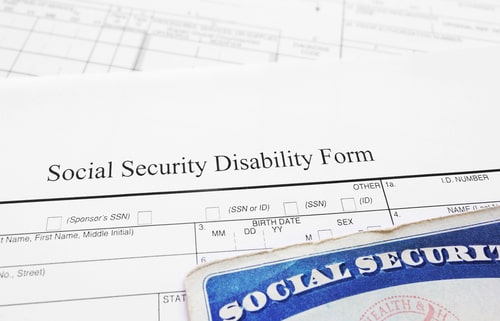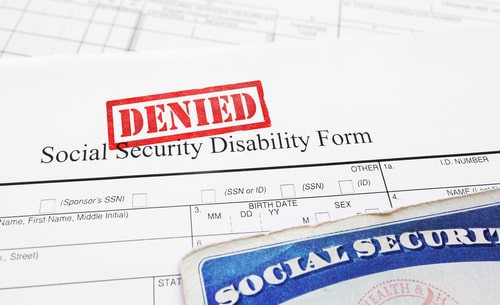Principal Office Located at 1424 Gables Court, Plano, TX 75075
Call Today For a Free Case Evaluation
Recent Blog Posts
What is the Federal Appeals Process for SSDI in Texas?
 If you applied for Social Security Disability Insurance (SSDI) benefits and your claim has been denied, do not lose hope. You have the right to appeal the decision and potentially receive the benefits you deserve. A Texas lawyer can guide you through the federal appeals process for SSDI, helping you understand each step along the way.
If you applied for Social Security Disability Insurance (SSDI) benefits and your claim has been denied, do not lose hope. You have the right to appeal the decision and potentially receive the benefits you deserve. A Texas lawyer can guide you through the federal appeals process for SSDI, helping you understand each step along the way.
Request a Reconsideration
The first step in the appeals process is to request a reconsideration of your initial claim denial. You have 60 days from receiving the notice of denial to submit your request. Your case will be reviewed by a new disability examiner and medical consultant during reconsideration, both of whom were not part of the initial decision. We will thoroughly review all the evidence you submitted with your original application and any new evidence you provide.
The Impact of State Laws on Veterans' SSDI Benefits in Texas
 As a veteran in Texas seeking Social Security Disability Insurance (SSDI) benefits, it is beneficial to understand how state laws can impact your claim. There are several measures to support veterans in their pursuit of SSDI, and working with a knowledgeable Texas lawyer can help you through the complex steps between state and federal regulations.
As a veteran in Texas seeking Social Security Disability Insurance (SSDI) benefits, it is beneficial to understand how state laws can impact your claim. There are several measures to support veterans in their pursuit of SSDI, and working with a knowledgeable Texas lawyer can help you through the complex steps between state and federal regulations.
Texas' Commitment to Supporting Veterans
Texas has a long-standing history of supporting its veteran population. The state legislature has enacted several laws aimed at improving the lives of those who have served our country. These laws often complement federal SSDI regulations, creating a more comprehensive support system for disabled veterans.
One notable example of Texas' veteran-friendly legislation is the property tax exemption for disabled veterans. This exemption ensures that veterans' SSDI benefits are not diminished by rising property taxes, helping to maintain their financial stability.
How to Prove Your Condition is Severe Enough for SSDI
 Living with a severe medical condition can be too much to handle, especially when it interferes with being able to work and earn a living. If you find yourself in this situation, you may be eligible for Social Security Disability Insurance (SSDI) benefits. However, the process of proving that your condition meets the criteria for a “severe” impairment can be challenging. A Texas lawyer can help make sure your claim is strong.
Living with a severe medical condition can be too much to handle, especially when it interferes with being able to work and earn a living. If you find yourself in this situation, you may be eligible for Social Security Disability Insurance (SSDI) benefits. However, the process of proving that your condition meets the criteria for a “severe” impairment can be challenging. A Texas lawyer can help make sure your claim is strong.
Understand the Definition of “Severe”
When it comes to SSDI, the definition of a “severe” impairment is crucial. The Social Security Administration (SSA) sets a specific threshold for what qualifies as a severe condition that significantly limits your ability to perform basic work-related activities for at least 12 consecutive months. This definition encompasses both physical and mental impairments.
How to Document Your Disability for SSDI Applications
 One of the most critical aspects of your application is providing sufficient documentation to prove your disability. A Texas lawyer can guide you through the steps to effectively document your disability and increase your chances of a successful SSDI application.
One of the most critical aspects of your application is providing sufficient documentation to prove your disability. A Texas lawyer can guide you through the steps to effectively document your disability and increase your chances of a successful SSDI application.
How Does Texas Define “Disability”?
According to Texas law, a disability is defined as a medically determinable physical or mental impairment that has lasted or is expected to last for at least 12 months or result in death. The impairment must prevent you from engaging in substantial gainful activity (SGA). It is essential to understand this definition when gathering documentation for your SSDI application.
What to Know About SSDI for Vision Impairment
 Visual impairments can significantly impact an individual's ability to work and maintain financial stability. When you suffer from severe vision loss, you may qualify for Social Security Disability Insurance (SSDI) benefits. A Texas lawyer can help determine if you have potential eligibility criteria, the application process, and what to expect when seeking these benefits.
Visual impairments can significantly impact an individual's ability to work and maintain financial stability. When you suffer from severe vision loss, you may qualify for Social Security Disability Insurance (SSDI) benefits. A Texas lawyer can help determine if you have potential eligibility criteria, the application process, and what to expect when seeking these benefits.
SSDI Eligibility for Vision Impairment
To be eligible for SSDI due to vision impairment, you must satisfy the Social Security Administration's definition of legal blindness. This indicates that your vision cannot be improved beyond 20/200 in your better eye or that your visual field is limited to 20 degrees or less. Meeting these criteria could make you eligible for SSDI benefits, assuming you have paid enough Social Security taxes and have accumulated the necessary work credits through sufficient work history.
Getting SSDI for Rare Conditions in Texas
 Living with a rare medical condition can be physically, emotionally, and financially challenging. In Texas, individuals with rare conditions may be eligible for Social Security Disability Insurance (SSDI) benefits, which can provide much-needed financial assistance. However, obtaining SSDI for rare conditions is not typically easy. A Texas lawyer can help you strategize a plan and the steps involved to increase your chances of success.
Living with a rare medical condition can be physically, emotionally, and financially challenging. In Texas, individuals with rare conditions may be eligible for Social Security Disability Insurance (SSDI) benefits, which can provide much-needed financial assistance. However, obtaining SSDI for rare conditions is not typically easy. A Texas lawyer can help you strategize a plan and the steps involved to increase your chances of success.
Understanding Rare Conditions and SSDI Eligibility
According to The Social Security Administration (SSA), a rare condition is a medical condition that affects less than 200,000 individuals in the United States. These conditions can range from genetic disorders to rare forms of cancer or autoimmune diseases. To qualify for SSDI benefits, your condition must meet the SSA’s definition of disability, which involves severe physical or mental impairments that prevent you from engaging in substantial gainful activity.
How State Laws Affect Veterans with SSDI in Texas
 As a veteran residing in Texas and receiving Social Security Disability Insurance (SSDI), it is crucial to understand how state laws can impact your benefits and overall well-being. A Texas lawyer can help you explore the various ways legislation interacts with SSDI and the resources available to you.
As a veteran residing in Texas and receiving Social Security Disability Insurance (SSDI), it is crucial to understand how state laws can impact your benefits and overall well-being. A Texas lawyer can help you explore the various ways legislation interacts with SSDI and the resources available to you.
Understanding SSDI for Veterans
SSDI is a federal program that provides financial assistance to individuals who have become disabled and are unable to work. For veterans, SSDI can be a vital lifeline, helping them maintain their quality of life and support their families. To qualify for SSDI, veterans must have a medical condition that meets the Social Security Administration’s definition of disability and have worked long enough to earn sufficient credits.
Texas’ Support for Veterans with Disabilities
Texas has a long history of supporting its veteran population, and this commitment extends to those receiving SSDI. The state offers various programs and services designed to assist veterans with disabilities, including:
Getting Social Security Disability Benefits for Lupus
 If you have lupus, you may wonder if you can qualify for Social Security Disability Insurance (SSDI) benefits. The good news is that lupus is on the Social Security Administration’s list of qualifying conditions. However, you still must meet certain criteria to get approved. A Texas lawyer can help you break down what you need to know to get SSDI benefits for lupus.
If you have lupus, you may wonder if you can qualify for Social Security Disability Insurance (SSDI) benefits. The good news is that lupus is on the Social Security Administration’s list of qualifying conditions. However, you still must meet certain criteria to get approved. A Texas lawyer can help you break down what you need to know to get SSDI benefits for lupus.
Documenting Your Lupus Diagnosis
The first step is ensuring you have medical records from a rheumatologist or other specialist confirming your lupus diagnosis. These records should show medical records indicating you have lupus. This proof could be in the form of a lab test or an anti-nuclear antibody (ANA) test. You will need to prove your ongoing appointments and treatment for your symptoms.
Meeting the SSA Definition of Disability
The Social Security Administration has a strict definition of disability to qualify for SSDI benefits. You must prove that you cannot work because of a serious medical condition expected to last at least one year or result in death. You should also show that you are unable to perform work tasks because of your medical disability.
Submitting Your Appeal for Disability
 When you first apply for Social Security disability benefits, there is a good chance your claim may be denied. Nationally, about two-thirds of initial disability claims are denied. If this happens to you, do not give up. You have the right to appeal, and going through the entire appeals process significantly improves your chances of eventually being approved. A Texas disability lawyer can help through the process.
When you first apply for Social Security disability benefits, there is a good chance your claim may be denied. Nationally, about two-thirds of initial disability claims are denied. If this happens to you, do not give up. You have the right to appeal, and going through the entire appeals process significantly improves your chances of eventually being approved. A Texas disability lawyer can help through the process.
The Reconsideration Process
The first level of appeal after an initial denial is called a Request for Reconsideration. At this stage, a different disability examiner reviews your entire claim and makes a new decision. They take a fresh look at all the documents, medical records, and other evidence you submitted initially when you applied.
While the reconsideration appeal provides another opportunity to get approved, most reconsideration appeals (around 90% nationwide) are still denied again. So, there is a high probability your claim will be sent on to the hearing level of the appeals process.
Can You Get Disability for Crohn’s Disease?
 Crohn’s disease is an inflammatory bowel disease that causes chronic inflammation and damage to the digestive tract. It is not uncommon for people to be unable to complete tasks because of this. Crohn’s is considered a disability under Social Security law if severe enough to prevent someone from working. A Texas disability lawyer may be able to help you if your condition prevents you from doing work-related tasks.
Crohn’s disease is an inflammatory bowel disease that causes chronic inflammation and damage to the digestive tract. It is not uncommon for people to be unable to complete tasks because of this. Crohn’s is considered a disability under Social Security law if severe enough to prevent someone from working. A Texas disability lawyer may be able to help you if your condition prevents you from doing work-related tasks.
What Qualifies as Disabled Under Social Security?
To get Social Security disability benefits for Crohn’s disease, your symptoms must prevent you from working and be expected to last at least one year. Specific criteria the Social Security Administration (SSA) uses to evaluate digestive disorders like Crohn’s disease include:
- Number of bowel movements per day and presence of fecal incontinence
- Side effects from treatments impacting the ability to work

 972-671-9922
972-671-9922





